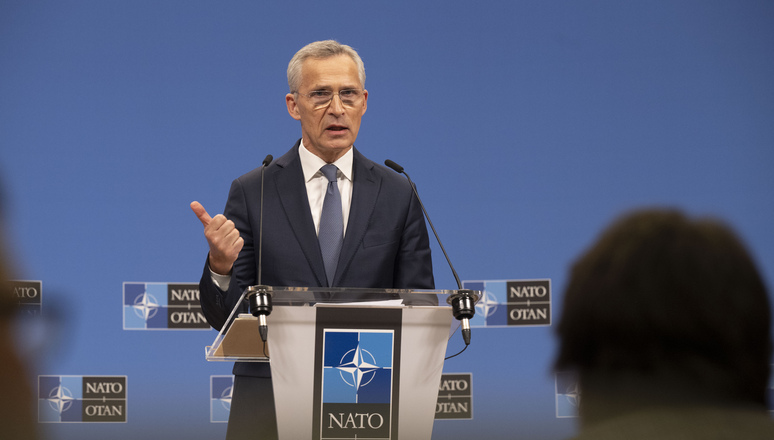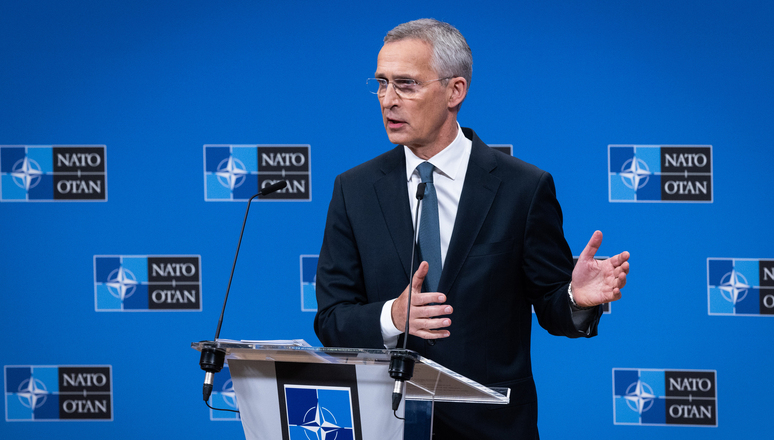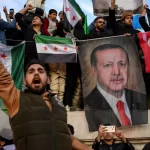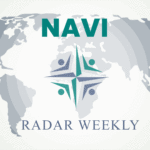On the NAVI Radar Weekly
10-16 June 2024
Subscribe to NAVI Radar Weekly here
Focus Point: Regional Security- Transatlantic Security/NATO
Navigating the Future: Key Findings from Allied Command Transformation’s 2023 Strategic Foresight Analysis | NATO ACT
NATO ACT | 07.06.2024

The Strategic Foresight Analysis 2023 – commonly called the SFA23 – provides a shared understanding of the evolving security environment to 2043, building out the context for Allied Futures thinking. The years to come will likely be defined by further strategic upheavals and structural disruptions, driven by state and non-state actors.
The research identified 170 trends, and their confluences were assessed with a view of the most demanding outcomes reduced to the most relevant groupings. These seven primary drivers shaping the evolution of the security environment are:
- Climate breakdown and the loss of biodiversity is the most consequential and, in the long-term, the most likely existential challenge.
- Resource scarcity driving instabilities is expected to increase and drive further instability, competition and conflict.
- Age of Artificial Intelligence emerging and disruptive technologies will reshape states, societies and armed forces as well as the character of competition and warfare with unprecedented speed.
- Geoeconomics enabling polarization causing significant implications for trade, technology, demographics, and the global financial system, potentially weakening globalization.
- Human networks empowered through the rise of networked non-state actors, technological empowerment, urbanization challenges, changing values, and information/disinformation overload is highly certain.
- Scramble for the commons expands due to resource needs, strategic competition and the rapid advancement of technology.
- International order in transition by means of accelerating changes, strategic shocks, pervasive instability and autocratic states will substantially challenge and further fragment the rules-based international order, intensify strategic competition as well as the emergence of new forms of security cooperation and military alliances. Read more…
Focus Point: Regional Security- Transatlantic Security/European Security
5 things to know about the EU election results | Politico
Aitor Hernández-Morales and Hanne Cokelaere| 10.06.2024

Europe’s conservatives are ecstatic.
The European People’s Party (EPP) scored a clear victory in Sunday’s European Parliament election, tightening its grip on the chamber even as far-right groups made major gains across the bloc.
The center-right force is on track to have around 184 lawmakers in Parliament, a quarter of the 720 in the hemicycle, according to provisional data. It is the only centrist party to have grown in this election: The center-left Socialists and Democrats (S&D) remained stable, while the liberal Renew Europe group was decimated.
From its position of power, the EPP is best placed to set EU policy, tilting the agenda to the right. “We are the party of industry, we are the party of rural areas, we are the farmers’ party of Europe,” Manfred Weber, the leader of the EPP Group in the Parliament, recently told POLITICO.
While the EPP could once again join a grand coalition with the socialists and liberals, it could also negotiate a working relationship on some issues with parties further to the right — if it can do so without alienating its centrist allies. Read more…
Read more : What is the EU election? A beginner’s guide – POLITICO
Focus Point: Regional Security- Transatlantic Security/NATO
Secretary General underlines B9 countries’ crucial role in strengthening NATO’s deterrence and defence | NATO
NATO |11.06.2024
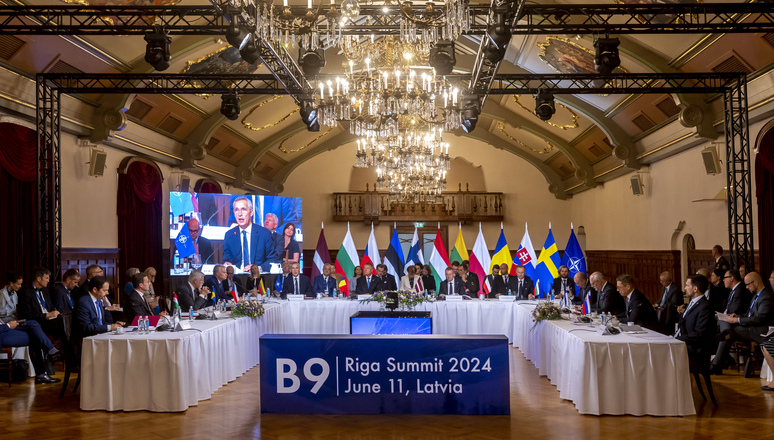
Secretary General Jens Stoltenberg attended the B9 (Bucharest Nine) Summit in Riga on Tuesday (11 June 2024) to discuss preparations for the NATO Summit, as well as boosting support to Ukraine. The Summit was hosted by Latvian President Edgars Rinkēvičs and co-chaired by Polish President Andrzej Duda and Romanian President Klaus Iohannis.
Mr Stoltenberg emphasised the crucial role B9 countries play in strengthening NATO’s deterrence and defence. “You host our eight multi-national battlegroups; you have increased the readiness of your forces; you lead by example on defence spending; and you are at the forefront of Allied support to Ukraine,” said the Secretary General.
The B9 format was established in the aftermath of Russia’s illegal annexation of Crimea in 2014. Nine Allies from the eastern flank take part in this format: Bulgaria, Czechia, Estonia, Hungary, Latvia, Lithuania, Poland, Romania, and Slovakia. Finland and Sweden also took part in the B9 Summit in Riga. Read more…
Focus Point: Regional Security- Transatlantic Security/European Security
The great EU top jobs puzzle is nearly solved |Politico
Barbara Moens, Aıtor Hernández-Morales, Jacopo Barıgazzı and Eddy Wax| 12.06.2024
An unusually early consensus appears to be emerging around the preferred names to sit at the EU’s top table:
Germany’s Ursula von der Leyen for a second term as European Commission president,
Portugal’s António Costa as European Council president,
Malta’s Roberta Metsola as the European Parliament boss and
Estonia’s Kaja Kallas as foreign policy chief.
While nothing is set in stone, the outline of a deal is expected by the informal dinner penciled in for the bloc’s leaders on June 17, eight European officials and diplomats told POLITICO. All were granted anonymity to speak candidly about ongoing conversations among Europe’s leaders. Read more…
Focus Point: Security and Defense Policy- Great Power Competition
Putin and Turkey’s top diplomat hold crucial talks on Ukraine war| Essanews
MZU | 12.06.2024|
On Tuesday, the head of Turkish diplomacy participated as a guest in the meeting of leaders from the BRICS group (Brazil, Russia, India, China, and South Africa) in Nizhny Novgorod. Turkey is considering joining this organization.
Putin then received him. The Turkish news agency Anatolia, citing diplomatic sources, later reported that during the meeting with the Russian leader, Fidan assessed that relations between Turkey and Russia “are very well.”
The topic of the war in Ukraine was also discussed during the conversation. The head of Turkish diplomacy assured that his country is “determined to continue all possible mediation efforts” regarding Ukraine.
The minister reiterated the proposal made by Turkish President Recep Tayyip Erdogan. The politician announced in March that he is ready to host a summit between Ukraine and Russia.
During his visit to Russia, the head of Turkish diplomacy also met with his Russian counterpart Sergey Lavrov. According to Reuters, the talks concerned “economic matters important to Turkey” and the war between Israel and Hamas. Read more…
Focus Point: Security and Defense Policy- Russia-Ukraine War
Defence Ministers prepare for Washington Summit, by strengthening defences and bolstering support for Ukraine | NATO
NATO| 12.06.2024
On Wednesday (12 June 2024) Secretary General Jens Stoltenberg outlined the priorities for the meeting of NATO Defence Ministers on Thursday and Friday (13 and 14 June 2024).
Acknowledging the challenging security environment, Mr Stoltenberg reiterated NATO’s commitment to preserve peace, prevent coercion, and deter aggression. “We will bolster our support to Ukraine, we will strengthen our defences, and we will send a strong message of deterrence to our adversaries,” he concluded.
Acknowledging the challenging security environment, Mr Stoltenberg reiterated NATO’s commitment to preserve peace, prevent coercion, and deter aggression. “We will bolster our support to Ukraine, we will strengthen our defences, and we will send a strong message of deterrence to our adversaries,” he concluded. Read more…
Focus Point: Security and Defense Policy- Defense Discussions
How to write a strategy| NATO NDC
Christopher M. Schnaubelt | 13.06.2024

Writing a strategy is difficult because the purpose is to change the behavior of humans. The most common context for strategy is in the sphere of military activities: how to apply force in a manner that breaks the will of an enemy, causing that enemy to stop fighting. However, strategy can also be useful at less intense levels of conflict such as crisis management and stability operations. Indeed, strategy can be used for peaceful but competitive purposes such as government tax policy or corporate marketing of consumer products.
This paper expresses strategy as a formula: Strategy = Ends + Ways + Means + Risk
wherein Ends are the objectives or the “what” the strategy intends to accomplish; Ways are the strategic concepts/courses of action or the “how” that describes the methods of applying the means to attain the ends; and Means are the resources. Risk is the degree to which the Ends exceed the Ways + Means. Read more…
Focus Point: Regional Security- Transatlantic Security/NATO
Allied Forsesight Conference 2024: ACT now, to SHAPE the future!| NATO ACT
NATO Command and Control Centre of Excellence |14.06.2024
Earlier this week (10-12 June, 2024), the NATO Command and Control Centre of Excellence joined the first Allied Forsesight Conference in Helsinki, Finland. A conference organized by HQ SACT and the Finish Ministry of Defence.
The conference aimed to enhance understanding of the effectiveness, flexibility, and methodologies of foresight practices, emphasizing their critical importance in policy development and defense planning. One of the goals was to uncover the most relevant future scenarios alongside their likely implications, challenges, and opportunities through high-level and expert discussions.
During the two information-dense days of the conference, it became clear that adaptability is the key to success for both nations and the alliance as a whole, given the unpredictability of the future. Strategic foresight and futures thinking are becoming increasingly important amidst emerging shocks and transformative changes, necessitating timely convergence between NATO ACO and NATO Allied Command Transformation (ACT).
Working towards a future whole-of-society approach requires more than just accepting technology as it is; it underscores the importance of unity and agility within the alliance. As the decision cycle speeds up, it becomes difficult to maintain pace or stay ahead without the correct use of technology within planning tools and mechanisms, all while safeguarding interoperability.
Colonel Mietta Groeneveld, Director of NATO C2COE, stated, “This was an interesting event highlighting the urgent need for change, as NATO is on the brink of huge challenges and threats that demand it. Threat-based planning involves aligning political will with available capabilities, and the time to do that is now. Act now, to Shape the future!”. Read more…
Focus Point: Regional Security- Transatlantic Security/NATO
NATO Defence Ministers agree plan to lead coordination of security assistance and training for Ukraine, address deterrence and defence | NATO
NATO | 14.06.2024 | A must read
NATO Defence Ministers concluded a two-day meeting on Friday (14 June 2024) to prepare the Washington Summit in July. They discussed strengthening NATO’s deterrence and defence and support for Ukraine.
On Ukraine, ministers agreed a plan on how NATO will lead the coordination of security assistance and training. “This will allow NATO leaders to launch this effort at the Washington Summit in July, putting our support to Ukraine on a firmer footing for years to come,” said Mr Stoltenberg. With a command in Wiesbaden, Germany, NATO will coordinate training and equipment donations, with nearly 700 personnel from Allied and partner nations involved in this effort. NATO will also facilitate equipment logistics and provide support to the long-term development of Ukraine’s Armed Forces. “These efforts do not make NATO a party to the conflict, but they will enhance our support to Ukraine to uphold its right to self-defence,” said the Secretary General.
Defence ministers also agreed on response options for Russia’s hostile actions against Allies. These include increased intelligence exchange, enhanced protection of critical infrastructure, including undersea and in cyber space, and further restrictions on Russian intelligence operatives. “Russia’s campaign will not deter us from supporting Ukraine and we will continue to protect our territories and populations against any kind of hostile actions,” said Mr Stoltenberg.
On deterrence and defence, ministers discussed new NATO defence plans, which military planners are translating into concrete requirements for the forces and capabilities needed to defend Allies. “Allies are offering forces to NATO’s command at a scale not seen in decades. Today we have 500,000 troops at high readiness across all domains, significantly more than the goal that was set at the 2022 Madrid Summit,” said Mr Stoltenberg. He added that Allies are investing in key capabilities, noting that “over the next five years, NATO Allies across Europe and Canada plan to acquire thousands of air defence and artillery systems, 850 modern aircraft – mostly 5th generation F-35s – and also a lot of other high-end capabilities.” NATO is also investing in innovation, including over 1 billion dollars in the NATO Innovation Fund. Allies discussed a new Defence Industrial Pledge which will scale up military production and solidify long-term cooperation with industry.
In a meeting of the Nuclear Planning Group on Friday, defence ministers also discussed the ongoing adaptation of NATO’s nuclear capabilities. “We are a nuclear Alliance – committed to being responsible and transparent. But clear in our resolve to preserve peace, prevent coercion, and deter aggression,” said Mr Stoltenberg. Read more…
Focus Point: Regional Security- Indo-Pacific Security
FACT SHEET: The 2024 G7 Summit in Apulia, Italy | The US Embassy-Italy
The US Embassy-Italy | 14.06.2024

President Biden and G7 leaders stood united at the G7 Summit in Apulia, Italy, taking bold action to meet the tests of our time: supporting Ukraine’s fight for freedom and driving up the costs of Russia’s war, pushing back on unfair economic practices, tackling the climate crisis and food and health insecurity, harnessing critical technologies for the benefit of all, and working with partners around the world to support developing countries investing in their futures.
Supporting Ukraine’s Fight for Freedom
Joined by Ukrainian President Zelenskyy, G7 leaders reaffirmed their unwavering support for Ukraine for as long as it takes – sending an unmistakable signal to Putin that he will not outlast our resolve.
- Unlocking $50 billion for Ukraine
- Driving Up Costs for the Russian War Machine
- Supporting Ukraine Now and in the Future.
Advancing International Peace, Security, and Prosperity
The G7’s work is grounded in a shared commitment to respect the UN Charter, promote international peace and security, and uphold the free and open rules-based international order.
- Calling for a Comprehensive Deal in Gaza
- Standing with Allies and Partners in the Indo-Pacific
- Deepening Cooperation with Partners in Africa
Promoting Economic Resilience and Economic Security
President Biden rallied the G7 to take further steps to protect our workers, industries, and the investments we are making from begin undermined by the PRC’s unfair practices. The PRC’s policies are creating global spillovers, including harmful overcapacity, that undercut market firms and lead to supply chain dependencies in sectors such as solar, wind, electric vehicles, lithium-ion batteries, medical devices, mature-node semiconductors, steel, aluminum, and others.
- Working Together to Level the Playing Field and Protect Economic Security
- Building Partnerships to Promote Resilient Supply Chains and Reduce Critical Dependencies
- Protecting Critical and Sensitive Technologies
Partnering with Developing Countries to Invest in their Future
The G7 is taking ambitious steps to scale up support to developing countries and accelerate progress toward the Sustainable Development Goals.
- Breaking the Global Debt Impasse
- Boosting the Financial Power of the International Financial Institutions
- Delivering on the Partnership for Global Infrastructure and Investment (PGI)
Accelerating the Clean Energy Transition to Address Climate Change
The G7 is accelerating its work to address the challenges of climate change, pollution, and biodiversity loss. G7 members reaffirmed ambitious COP28 commitments to triple renewable energy capacity, double global energy efficiency by 2030, and strengthen energy security.
- Phasing Out Unabated Coal Power and Increasing Energy Storage
- Building Clean and Resilient Supply Chains
- Promoting International Collaboration on Nuclear and Fusion Energy
Promoting Health and Food Security
The G7 continues to lead global efforts to address the food security crisis and support strong, resilient and responsive health systems around the world.
- Launching the Apulia Food Security Initiative
- Transforming Global Health Security Financing
- Expanding Immunization Coverage
- Addressing antimicrobial resistance (AMR)
Investing in Childcare to Support Women’s Economic Participation
The G7 is tackling the unequal gender distribution of care work, which contributes to gender inequality. The G7 committed to support, by 2035, at least 200 million more women to join the workforce by investing in efforts to close the global gap in the availability of childcare – including through the World Bank Invest in Childcare Initiative announced by First Lady Dr. Jill Biden in 2022 to help promote women’s economic opportunity. G7 partners have contributed more than $100 million to the World Bank to support more high-quality investments in childcare globally.
Enhancing Our Partnership on Migration
Drawn from the principles of the Los Angeles Declaration on Migration and Protection that President Biden launched at the Summit of the Americas in 2022, the G7 affirmed a collective commitment to addressing migration in ways that reflect both the challenges and opportunities it presents. Leaders endorsed a three-pronged approach focused on addressing root causes of irregular migration, strengthening safe and regular migration pathways, and enhancing border management and enforcement and curbing transnational organized crime.
Deepening Cooperation on Artificial Intelligence
In line with the Biden Administration’s vision laid out in the October 2023 Executive Order on the Safe, Secure, and Trustworthy Development and Use of Artificial Intelligence, the G7 is building partnerships around the world to ensure the benefits of artificial intelligence and other technologies are widely shared while mitigating risks.
- Bridging Technology Divides and Addressing AI’s Impact on Workers
- Increasing Coordination to Promote AI Safety:
- Promoting Resilient Technology Supply Chains
The G7 Summit was held in Borgo Egnazia (Fasano) in Apulia, on June 13-15, 2024. The event brought together the Leaders of the seven member States, as well as the President of the European Council and the President of the European Commission representing the European Union.
In line with previous G7 fora, representatives of a number of States and International Organisations took part in the work, invited by the Nation that holds the Presidency.
Focus Point: Social, Economic & Security- Migration
EU risks ‘blank cheque for dictators’ in Egypt migration deal | EUobserver
Benjamin Fox | 15.06.2024 | Subscription needed
The EU’s Strategic and Comprehensive Partnership with Egypt, signed off by EU Commission president Ursula von der Leyen in March, features €7.4bn in aid and financial support for Cairo.
Human rights groups have urged the EU to agree binding commitments as part of the bloc’s controversial multi-billion euro migration control and investment pact with Egypt.
In a letter to EU Commission president Ursula von der Leyen, shared with EUobserver, the group, which includes Amnesty International and Human Rights Watch, warned the EU to agree with Egypt “a roadmap for structural reforms, with public, clear, specific and time-bound indicators, targets and benchmarks for Egypt to meet its human rights obligations.”
They also published a list of political, media and civil society activists who are currently detained and which should immediately be released.
“Egyptian authorities immediately and unconditionally release all those detained solely for the peaceful exercise of their human rights including the rights to freedom of expression, association and peaceful assembly,” the letter said.
“Failing to set human rights benchmarks would instead be a blank check for further abuses and repression in Egypt,” the letter added. Read more…
Thank you very much for reading.
The NAVI Research Institute is the research division of NATO Veterans Initiative - NAVI that provides a unique perspective to transatlantic leaders and societies on peace and security through the lens of NATO's founding principles of rule of law, democracy, human rights, and individual liberties. The NAVI Research Institute was officially established by the NAVI Board on July 16th, 2023.
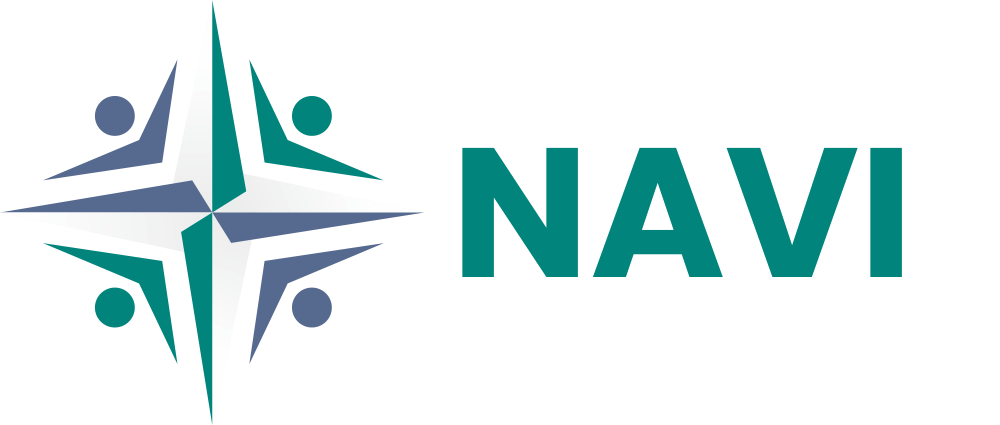
![NAVI-PROJE-[Recovered] Radar Weekly](https://nato-veterans.org/wp-content/uploads/2024/05/NAVI-PROJE-Recovered-696x392.gif)
